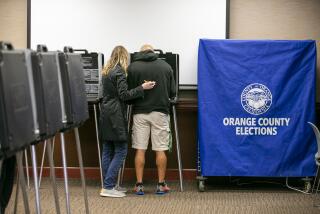Judge: Speed-Trap Case Threatens RICO : Courts: A finding of extortion could bankrupt Huntington Beach and force the government to repeal or modify the anti-racketeering law.
- Share via
LOS ANGELES — After hearing arguments that the city of Huntington Beach engaged in racketeering by allegedly operating a speed trap, a judge said Monday that the case could ultimately result in the repeal or revision of federal racketeering laws.
U.S. District Judge Stephen V. Wilson said in court that the speed-trap case, while unusual, seems to fit under the federal government’s controversial Racketeer Influenced and Corrupt Organizations law.
The fact that operation of a speed trap falls under the RICO law, and that Huntington Beach could be rendered bankrupt if it loses the case, could prompt reform efforts, Wilson said. He noted that there are many critics who contend that the law, which was designed to fight organized crime, has been unwisely applied in civil cases.
“Who knows?” Wilson said. “This (case) may be the straw that breaks the camel’s back. You may be in an historic position.”
Wilson could issue a summary judgment in the case--a decision without a trial--or direct a jury trial to hear the evidence. Alternatively, the judge might order all or part of plaintiff’s pleas to be granted, without a trial. Wilson said he will issue an order later this week.
The suit, filed last spring by Ernest J. Franceschi Jr., asks for $60 million in damages.
Franceschi, a Seal Beach lawyer, was arrested three times for speeding on a stretch of Pacific Coast Highway in Huntington Beach. His suit charges that the city was operating an illegal speed trap and that this constitutes extortion--getting money through threats or misuse of authority.
The city denies the allegation.
State law says a speed trap exists whenever a local government uses radar to enforce a speed limit below 55 m.p.h. without having made a traffic and engineering survey within the past five years. Such traffic surveys scientifically determine what the appropriate speed limit should be.
Franceschi has submitted evidence to federal court showing that Huntington Beach’s traffic and engineering survey has been out of date for about nine years.
Huntington Beach Deputy City Atty. Robert Sangster argued that there was no extortion because cited motorists always had the option of going to court.
Wilson responded, “Why isn’t it extortion?. . . The driver is being told, ‘We got you. We got you on the radar gun.’ ” Wilson said the arrested drivers in such cases do not know the use of radar, without an up-to-date traffic survey, is illegal. Thus, said Wilson, many motorists simply forfeit bail and do not go to court.
Sangster, in rebuttal, said no arrested motorist actually gives up anything in such cases. “There is no transfer of property,” Sangster said.
The judge responded: “Oh, yes there is.”
Franceschi’s suit asks that all persons arrested since 1981 in Huntington Beach’s alleged speed trap have their records cleared. The suit also estimates that the city and municipal courts took in about $20 million during the past nine years. RICO allows triple damages, and so the suit asks $60 million to be distributed to motorists who have been fined or who gave up bail because of alleged speed-trap arrests.
More to Read
Sign up for Essential California
The most important California stories and recommendations in your inbox every morning.
You may occasionally receive promotional content from the Los Angeles Times.













